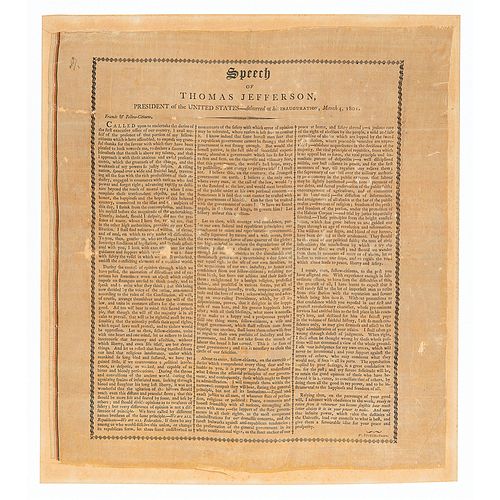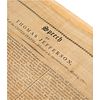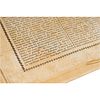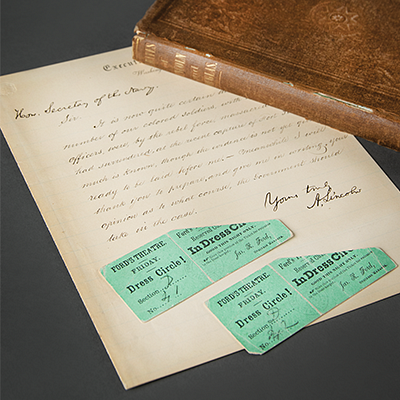Thomas Jefferson: Rare Silk Broadside of First Inaugural Address (1801)
Two ways to bid:
- Leave a max absentee bid and the platform will bid on your behalf up to your maximum bid during the live auction.
- Bid live during the auction and your bids will be submitted real-time to the auctioneer.
Bid Increments
| Price | Bid Increment |
|---|---|
| $0 | $5 |
| $50 | $10 |
| $200 | $25 |
| $500 | $50 |
About Auction
Sep 23, 2023
RR Auction support@rrauction.com
- Lot Description
Rare and historic silk broadside of Thomas Jefferson's first inaugural address, printed in 1801 by Baltimore publisher William Pechin (marked "W. Pechin—Print." at lower right). The broadside measures 14.5 x 16.25 and features a four-line header, "Speech of Thomas Jefferson, President of the United States—delivered at his Inauguration, March 4, 1801," with the text of the address printed in three columns below. In the historic address—considered one of the finest inaugurals of any president—Jefferson sought to strike a conciliatory tone after the contentious election of 1800, expressing a strong statement of American ideals. In small part: "Every difference of opinion is not a difference of principle. We have called by different names brethren of the same principle.—We are all Republicans.—We are all Federalists. If there be any among us who would dissolve this union, or change its republican form, let them stand undisturbed as monuments of the safety with which error of opinion may be tolerated, where reason is left free to combat it. I know indeed that some honest men fear that a republican government can not be strong; that this government is not strong enough. But would the honest patriot, in the full tide of successful experiment, abandon a government which has so far kept us free and firm, on the theoretic and visionary fear, that this government, the world's best hope, may, by possibility, want energy to preserve itself? I trust not. I believe this, on the contrary, the strongest government on earth." Affixed to a slightly larger mount and in very good condition, with light overall staining and small areas of fabric loss affecting a small portion of text.
This is an extremely rare printing of President Jefferson's inaugural address, with about five copies recorded. The printer, William Pechin, published the Baltimore Intelligencer from 1798-1800, followed by the Baltimore American and Commercial Daily Advertiser from 1802 to 1849. He was a strong supporter of Thomas Jefferson, releasing an 'election year edition' of his Notes on the State of Virginia in an effort to defend the candidate against charges that he was an 'enemy of religion.' He was also the first to print the lyrics to Francis Scott Key’s 'The Defense of Fort McHenry,' today known as 'The Star-Spangled Banner.'
Thomas Jefferson's inauguration was the first to be held in the nation's new capital, Washington, D.C. Historian Willard Sterne Randall describes the scene in Thomas Jefferson: A Life: 'He shunned the splendor of Washington’s and Adams’ inaugural parades in ceremonial carriages‰Û_The first president to be inaugurated in the capital city he had made his brainchild‰Û_Jefferson hiked up Capitol Hill, where he had insisted the Capitol be built on higher ground than the President’s House to symbolize the preeminence of the people‰Û_Arriving at the unfinished Capitol, Jefferson strode confidently between ranks of Alexandria riflemen who presented arms as he entered the only finished room, the Senate Chamber‰Û_Jefferson read from his carefully written inaugural address, his voice barely filling the chamber. In one of the immortal inaugural speeches, Jefferson began by stressing the 'sacred principle that, though the will of the majority is in all cases to prevail, that will, to be rightful, must be reasonable.'' - Shipping Info
-
Bidder is liable for shipping and handling and providing accurate information as to shipping or delivery locations and arranging for such. RR Auction is unable to combine purchases from other auctions or affiliates into one package for shipping purposes. Lots won will be shipped in a commercially reasonable time after payment in good funds for the merchandise and the shipping fees are received or credit extended, except when third-party shipment occurs. Bidder agrees that service and handling charges related to shipping items which are not pre-paid may be charged to a credit card on file with RR Auction. Successful international Bidders shall provide written shipping instructions, including specified Customs declarations, to RR Auction for any lots to be delivered outside of the United States. NOTE: Declaration value shall be the item’(s) hammer price and RR Auction shall use the correct harmonized code for the lot. Domestic Bidders on lots designated for third-party shipment must designate the common carrier, accept risk of loss, and prepay shipping costs.
-
- Buyer's Premium



 EUR
EUR CAD
CAD AUD
AUD GBP
GBP MXN
MXN HKD
HKD CNY
CNY MYR
MYR SEK
SEK SGD
SGD CHF
CHF THB
THB













